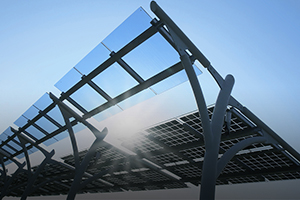Virtual Power Plant
 Although the solar industry has made great strides when it comes to generating clean, sustainable power, significant reductions in our reliance on fossil fuels will necessitate a total rethinking of our current distribution systems. First of all, the intermittent nature of renewable power sources (including solar, wind, wave and others) means that reliable and efficient methods of storing electricity are needed to meet power demands during “off-peak” periods. Secondly, it will be necessary to move away from large, centralized power plants to smaller networks of localized generators in order to minimize power losses associated with long distance transmission.
Although the solar industry has made great strides when it comes to generating clean, sustainable power, significant reductions in our reliance on fossil fuels will necessitate a total rethinking of our current distribution systems. First of all, the intermittent nature of renewable power sources (including solar, wind, wave and others) means that reliable and efficient methods of storing electricity are needed to meet power demands during “off-peak” periods. Secondly, it will be necessary to move away from large, centralized power plants to smaller networks of localized generators in order to minimize power losses associated with long distance transmission.
New York utility Consolidated Edison is currently working with a solar power developer and an energy storage company to test these ideas. The pilot program links together 300 solar-enabled homes as a virtual power plant to function as a single unified resource. Homeowners lease the solar panels from the utility and pay a fee to have backup batteries installed. The system has a combined generating capacity of 1.8 megawatts and storage capacity of four megawatt-hours, which will power 300 average sized homes for about 10 hours.
The goal of this initiative is to improve the reliability and resiliency of the power grid while reducing the number of fossil-fuel plants currently in use. Although the numbers are small, the project will lay the groundwork for much larger systems in the future, particularly as prices for batteries and other storage technologies continue to drop.
For information: Consolidated Edison Co. of New York, Inc., 4 Irving Place, Room 1650S, New York, NY 10003; phone: 212-460-4111; fax: 212-477-2546; Web site: http://www.coned.com/ or http://www.coned.com/newsroom/news/pr20160613.asp